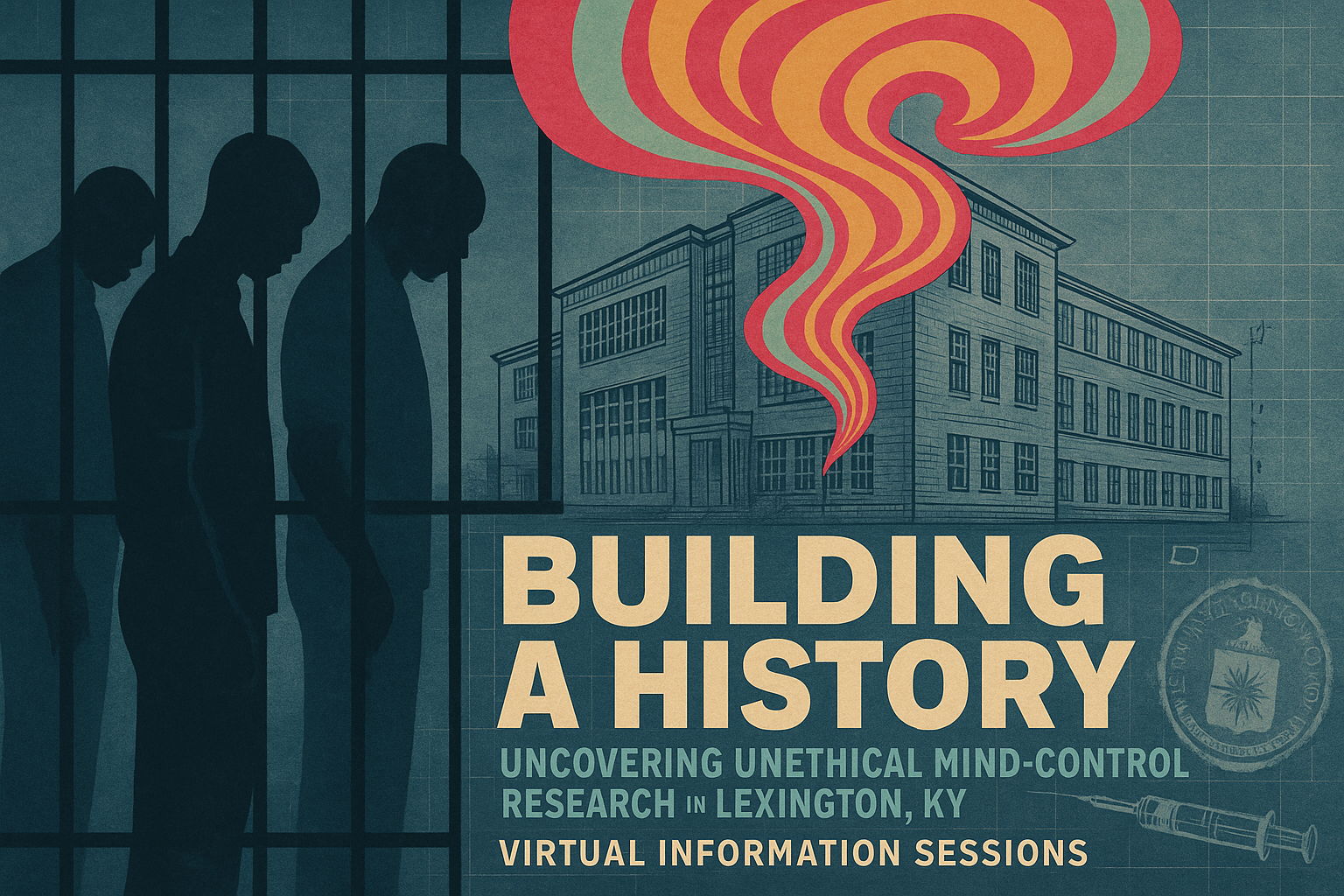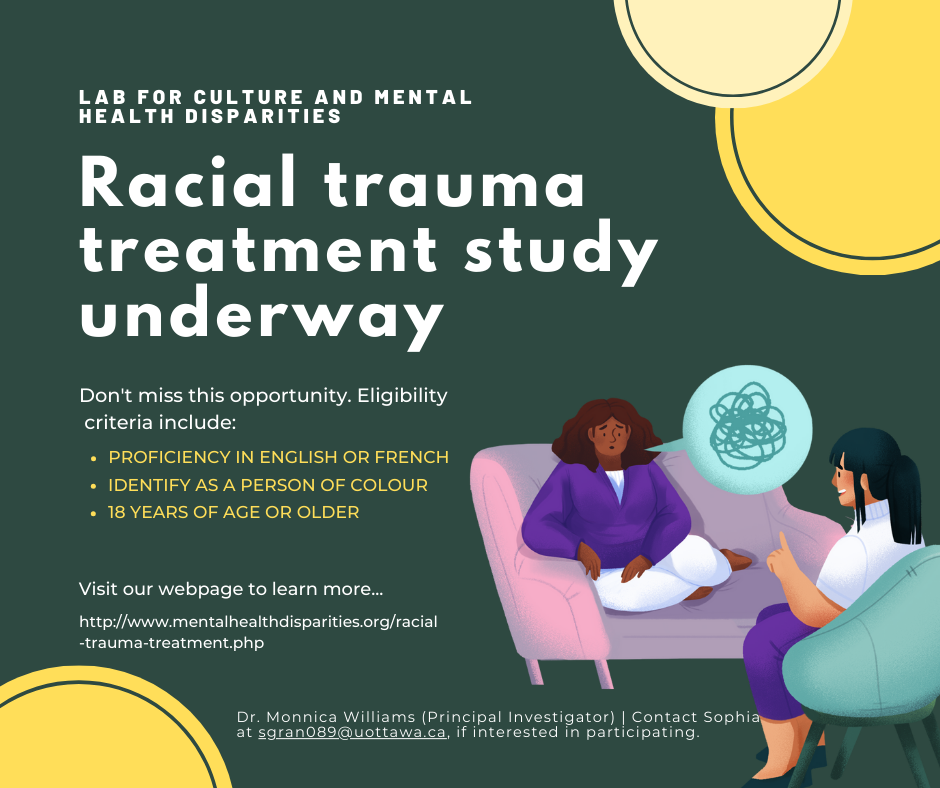Identity and Oppression-Based Trauma

Intervention for Racial and Ethnic Trauma
Due to the pervasiveness of identity-related stressors, it is particularly important to find solutions for those who have been traumatized by their cumulative experiences of discrimination.
Our lab is studying how a cognitive-behavioural specialized psychotherapy approach can help university students of colour heal from racial and ethnic trauma. It is important to reach this demographic, because their experiences combine the challenges of academic life with the persistent emotional toll of discrimination. This type of trauma puts students at increased risk of academic failure, substance misuse, and self-isolation.

Unlike standard clinical approaches, interventions tailored specifically to these types of trauma must acknowledge the culturally-specific manifestations of anxiety, depression, and PTSD symptoms triggered by repeated microaggressions, larger acts of discrimination, and/or systemic bias. By addressing these distinct factors, effective treatment can restore a sense of empowerment and well-being. Moreover, creating an effective treatment model can inform university support services, guide training for mental health professionals, and help create a more inclusive campus environment that actively mitigates the psychological harm caused by discrimination.
Related Works
Williams, M. T., Osman, M., Gran-Ruaz, S., & Lopez, J. (2021). Intersection of racism and PTSD: Assessment and treatment of racism-related stress and trauma. Current Treatment Options in Psychiatry, 8, 167–185.

Addressing the Mental Health Toll of Identity and Oppression-Based Traumas
The Laboratory for Culture and Mental Health Disparities (CMHD) tackles pressing issues such as identity and oppression-based trauma through research, education, and culturally-sensitive mental health care. It is not enough to examine just one aspect of a person's identity to the exclusion of other identities – people define themselves based on a multitude of identities, some of which are privileged and some of which are stigmatized. Immigrants, multicultural, and multiracial individuals face unique struggles in this context, often contending with conflicting expectations and exclusion, making them especially vulnerable to the impacts of identity-based stress. In short, the more frequently these individuals experience stigma, discrimination, and exclusion, the more likely they are to experience emotional distress that can significantly impact their well-being and success.
- Identity Trauma
- Oppression-Based Trauma
- Challenges of Intersectionality
Oppression-Based Trauma
Oppression-based trauma results from systemic inequities that perpetuate psychological and emotional harm, particularly among marginalized groups. At uOttawa, students experiencing cultural identity stigma often face compounding effects of racism and other forms of systemic oppression. Oppression-based trauma can lead to a range of symptoms, necessitating intersectional approaches to assessment and treatment. Despite these challenges, access to appropriate care remains limited; many therapists lack the specialized training needed to recognize and treat oppression-based stress. The CMHD bridges this gap by training for therapists, advocating for more comprehensive training for graduate students, conducting research on culturally-informed care to combat the lasting impacts of systemic oppression on students’ well-being.
Identity Trauma in Young People
Identity trauma arises from discrimination, exclusion, or stigma linked to cultural, racial, or ethnic identities, often resulting in psychological distress. Research at uOttawa’s CMHD underscores the pervasive nature of identity traumas among university students, with 77% of Black students and 83.3% of Latin American students reporting clinically significant symptoms related to their racial or ethnic identities. These findings align with research conducted using the Trauma Symptoms of Discrimination Scale (TSDS), which emphasizes the cumulative psychological effects of identity-based discrimination. We found that the more stigmatized identities a person has, the more trauma symptoms they have. To address this, CMHD develops measures to capture the toll of these experiences and carries out research studies in evidence-based therapy to foster healing. By collecting comprehensive data, CMHD not only refines interventions but also contributes to a broader understanding of identity trauma, echoing the need for empirical rigor in addressing the impacts of systemic discrimination.
Challenges of Intersectionality
Intersectional trauma arises when multiple marginalized identities intersect, amplifying the psychological burden of systemic oppression. CMHD’s research reveals that diverse coping strategies among students, such as seeking social support or self-education, often fall short due to structural barriers like untrained counselors and limited treatment options. These findings align with Ching et al. (2018), who outline the compounded stressors faced by individuals navigating intersecting identities, such as race and sexual orientation. For instance, Black Muslim students in Canada endure the dual traumas of racism and Islamophobia, underscoring the urgent need for intersectional frameworks in therapy (Williams, Moshirian Farahi et al., in press). CMHD’s holistic, evidence-based approach integrates these insights, aiming to empower students while informing systemic changes in mental health services to better address intersectional traumas.
This research builds upon prior work in our lab on racial microaggressions, confirming that what many may brush off as “small” incidents can have severe and lasting psychological consequences. Persistent exposure to assumptions based on stereotypes, exclusion, or hostility erodes a person’s sense of safety and belonging. Understanding this is key if we are to create healthier, more inclusive academic environments. We must recognize the deep emotional toll that racism takes on those who live through it, and take steps to address and dismantle it at every level.
Related Works
Williams, M. T., Moshirian Farahi, S. M. M., MacIntyre, M. M., Zare, M., Dasgupta, A., Abdulrehman, R. Y., Kogan, C., Ndengeyingoma, A., & Cénat, J. M. (in press). Black Muslims in Canada: The Intersectional Trauma of Racism and Islamophobia. Traumatology.
Williams, M. T., Osman, M., & Hyon, C. (2023). Understanding the psychological impact of oppression using the Trauma Symptoms of Discrimination Scale (TSDS). Chronic Stress, 7, 1-12.
Holmes, S. C., Zalewa, D., Wetterneck, C. T., Haeny, A. M., & Williams, M. T. (2023). Development of the Oppression-Based Traumatic Stress Inventory: A novel and intersectional approach to measuring traumatic stress. Frontiers in Psychology: Psychopathology, 14(1232561), 1-8.
Ching, T. H. W., Lee, S., Chen, J., So, R., & Williams, M. T. (2018). A model of intersectional stress and trauma in Asian American sexual and gender minorities. Psychology of Violence, 8(6), 657-668.
